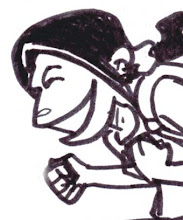Vocally, Apes and Androids seem very lethargic. They are a more inventive and equally addictive MGMT. A less insane, and more comprehensible, version of Mindless Self Indulgence. In parts the vocals go a bit "Scissor Sisters" too, with maybe a small hint of Marilyn Manson? There are many, many other comparisons that could be made, but I'll leave those for now and let you see what you think. I won't bombard you with prejudicial remarks.
To put them in a descriptive box, they are easy-going classic-rock with special appearances from electronic dance. Very MGMT, but with a bit more flair. Judging from Nights of the Week they are highly original in their song-writing: they don't stick to the general formula that most artists do which makes for a very fresh listen.
Nights of the Week starts with jangly guitaring - reminiscent of old 'driving' music - followed by
those relaxing, lethargic vocals mentioned earlier. Slowly but surely more instruments appear. The band have been incredibly inventive in putting this song together: it's not in the typical "verse, chorus, verse, chorus" format by any means. It's a concoction of various 'limbs' forming the body of the song. Each limb is different but with some specific markers which identify it as a recognisable and nameable thing.
First-off is the chorus limb, or the 'anti-chorus' so it seems. The drums drop out and leave a simple guitar riff and a small few words by the vocals. A tambourine joins in too, along with the synthesiser to keep the beat. From then on it's just the words "These are the nights of the week where you force yourself out of bed" which act as a flag for the chorus limbs.
The 'build-up' limb appears around the middle of the song, and contains very synthesised voices repeating the words "The nights of the week, the nights of the week" with a slight drumroll to keep the tension rising.
As for the other possible limbs, there are a million different names I could give them, but I think it's best to leave it unsaid. The song is a fantastic mix of mixes. Towards the end of the song the vocals seem to become more defined: it's possible to hear one voice that's not been drowned in 'synthesisation'.
The parts which will become the most recognised and widely repeated by listeners will be the sections with the vocals humming or "ow"ing along to the core riff. This little beauty has already wormed its way into my own vocal chords. With managers in multiple countries and press contacts crawling all over them, Apes & Androids are not doing too badly. If I could make music that sounds that fun for a living I'd do it in a heartbeat. They are set to be one of this year's success stories.







